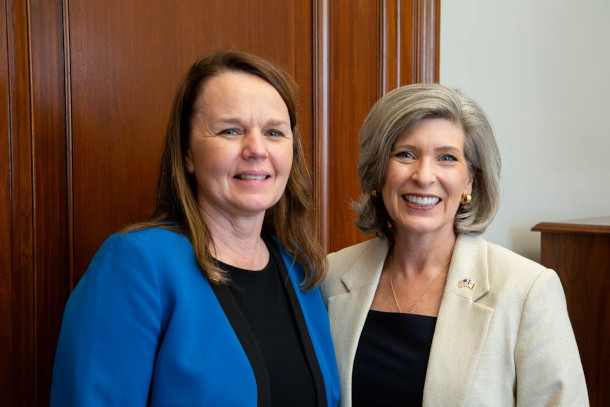Capital Update – For the Week Ending April 12, 2024
In this week’s National Pork Producers Council (NPPC) Friday recap: pork producers push priorities with members of Congress; Agriculture Chair Thompson says Farm Bill will move in May; Iowa pork producer attends Japan prime minister’s congressional address; U.S. pork exports continue to surge in 2024. Take a deeper dive below.
Pork Producers Push Priorities with Members of Congress
What happened: About 100 pork producers from around the country participated in NPPC’s spring Legislative Action Conference in Washington, DC. They lobbied lawmakers on several issues important to the U.S. pork industry and received updates on other matters of concern.
NPPC staff also updated producers on the economic state of the pork industry, the U.S. Department of Agriculture’s (USDA) pilot program allowing faster processing line speeds at packing plants, the use of MRNA vaccine technology in livestock production, and efforts to enhance the industry’s live swine traceability system.
Sen. Amy Klobuchar (D-MN) — who serves on the Committee on Agriculture, Forestry, and Nutrition — spoke to producers about Senate prospects for the next farm bill. Sandra Eskin, USDA’s deputy under secretary in the Office of Food Safety, discussed the agency’s line speeds pilot program.
Prior to the fly-in, NPPC President Lori Stevermer, President-elect Duane Stateler, Vice President Rob Brenneman, Past President Scott Hays, and CEO Bryan Humphreys hosted a media briefing that covered the state of the industry and a range of topics, including the farm bill, California Proposition 12, international trade, and labor.
During visits with their lawmakers, producers asked members of Congress to:
- Include in the next Farm Bill a legislative fix to California Proposition 12, which bans the sale in the state of pork from hogs born to sows raised anywhere in housing that does not meet California’s arbitrary standards. Of note, Stevermer this week penned an op-ed on new USDA research data, showing increased prices — attributed to Prop. 12 — for bacon, ribs, and loins (the three most purchased products on a volume basis).
- Renew and expand key Farm Bill programs that benefit U.S. agriculture, including ones that address foreign animal diseases:
- National Animal Health Laboratory Network.
- National Animal Disease Preparedness and Response Program.
- National Veterinary Stockpile.
- National Animal Vaccine and Veterinary Countermeasures Bank.
- Reform the process for securing TN visas, which are widely used to staff hog farm jobs, and expand H-2A visas to year-round agricultural workers to address a farm labor shortage.
- Add language in any appropriations bill to defund the promulgation, implementation, and enforcement of a series of pending new Packers and Stockyards Act (PSA) rulemakings that could encourage frivolous litigation and change the requirement to show harm to competition.
- Support the “Beagle Brigade Act” to provide congressional authority to the U.S. Department of Agriculture’s National Detector Dog Training Center, which trains canines used at U.S. ports of entry to detect agricultural contraband.
- Sign a congressional letter to the U.S. Trade Representative, urging them to engage counterparts and utilize all tools available to ensure South Africa provides fair market access for U.S. pork, as outlined in the African Growth and Opportunity Act (AGOA). South Africa is failing to live up to the market access commitments it negotiated in 2016 when it was being considered for inclusion in AGOA, which allows eligible sub-Saharan African countries to export goods to the United States duty-free.

Sen. Amy Klobuchar (right) speaks with pork producers in Washington, D.C.
USDA Food Safety and Inspection Service Deputy Under Secretary Sandra Eskin addresses pork producers at the Spring fly-in.

Agriculture Chair Thompson: Farm Bill Will Move in May
What happened: House Agriculture Committee Chairman Glenn “GT” Thompson (R-PA) said he will move a bipartisan Farm Bill out of his committee in May. The committee’s ranking member, David Scott (D-GA), said the legislation will move on a joint timeline.
One of the sticking points that has prevented action on the House’s five-year agricultural blueprint — changes to the Supplemental Nutrition Assistance Program — appears to be resolved. Thompson indicates there will be “no cuts to benefits,” something panel Democrats vehemently opposed. He wants to make changes in how benefits are adjusted, at which Democrats also have balked.
NPPC’s take: NPPC wants a new Farm Bill approved as soon as possible and supports legislation that includes robust funding for FAD preparedness and addresses the challenges presented by California’s Proposition 12. NPPC also wants increased funds for the Market Access Program and Foreign Market Development export promotion programs.
Why it matters: The Farm Bill sets farm, conservation, forestry, and nutrition policy and authorizes various agricultural programs, including ones related to foreign animal disease (FAD) preparation and prevention and export promotion.

NPPC board members talk farm bill with House Agriculture Committee Chairman G.T. Thompson. Left to right: North Carolina producer Bob Ivey, Ohio producer and NPPC President-elect Duane Stateler, Iowa producer and NPPC Vice President Rob Brenneman, Chairman Thompson, Minnesota producer and NPPC President Lori Stevermer, Dr. Jeremy Pittman, and North Carolina producer Neill Westerbeek.
Iowa Pork Producer Attends Japan Prime Minister’s Congressional Address
What happened: President Joe Biden met with Japanese Prime Minister Fumio Kishida in Washington, D.C., to discuss Japan taking a bigger international role on defense and the economy in the Asia-Pacific region.
Of note, Iowa pork producer Trish Cook attended Kishida’s address to a joint session of Congress as a guest of Sen. Joni Ernst (R-IA). Cook, a past president of the Iowa Pork Producers Association, was in town for NPPC’s legislative fly-in.
Why it matters: Japan is one of the U.S. pork industry’s top export markets, taking $1.397 billion of product in 2023, making it the No. 2 destination for U.S. pork. Maintaining the trade relationship between the United States and Japan is critical and a top priority of NPPC, especially as U.S. producers face high input costs, unstable domestic consumer demand, a patchwork of unworkable state policies, such as California’s Proposition 12, and the closure of processing facilities.

Trish Cook (left) meets with Sen. Ernst before Prime Minister Fumio’s address to Congress.
U.S. Pork Exports Continue to Surge in 2024
What happened: Exports of U.S. pork continued their robust growth in the first two months of 2024, according to recently released data by the U.S. Departments of Agriculture and Commerce. They increased 10% in volume, to 502,585 metric tons (mt), and 10% in value, to $1.37 billion, over the same period last year.
As it was for all of 2023, Mexico was the top destination for U.S. pork in January and February, totaling 196,452 mt worth nearly $397 million, up 12% and 15%, respectively, from the same time in 2023.
Other strong markets during the two-month period included South Korea, which saw volume increase 61%, to almost 42,000 mt, and value jump up 62%, to $137 million, compared with January-February 2023. Exports to South America, Central America, and the Caribbean also were strong.
U.S. pork exports saw tremendous growth in Australia at the beginning of 2024, with increases of 232% in volume, to 17,553 mt, and 229% in value, to $62.9 million, over January-February 2023. Malaysia also had significant growth, up 848% in volume, to 844 mt, and 734% in value, to $2.5 million.
Why it matters: Exports accounted for $61.45 in average value from each hog marketed the price producers received for each hog marketed in January and February, up 4% from the same period in 2023. They accounted for 25.0% of total production, an increase of 1.7% from the same month one year ago.